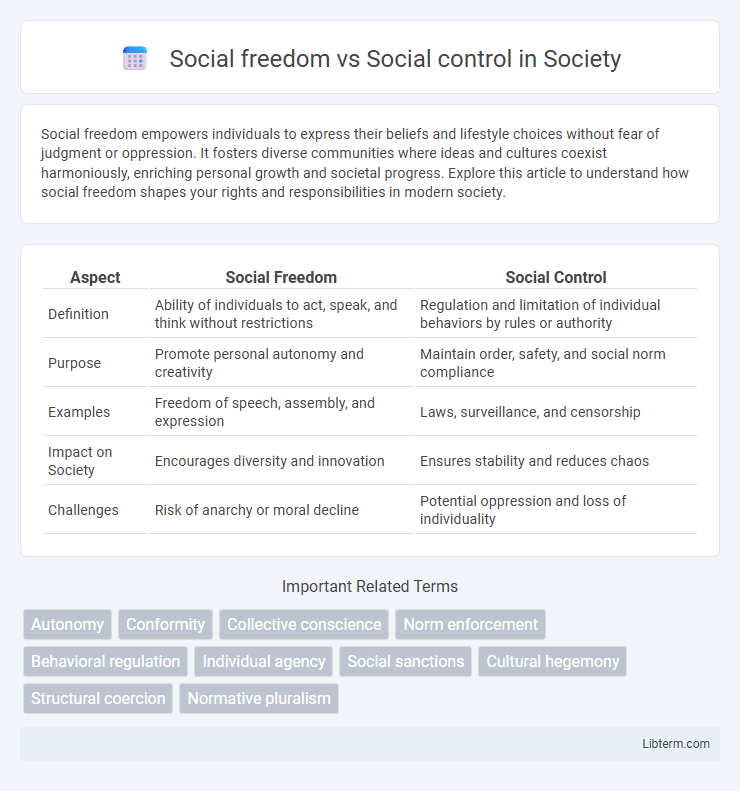Social freedom empowers individuals to express their beliefs and lifestyle choices without fear of judgment or oppression. It fosters diverse communities where ideas and cultures coexist harmoniously, enriching personal growth and societal progress. Explore this article to understand how social freedom shapes your rights and responsibilities in modern society.
Table of Comparison
| Aspect | Social Freedom | Social Control |
|---|---|---|
| Definition | Ability of individuals to act, speak, and think without restrictions | Regulation and limitation of individual behaviors by rules or authority |
| Purpose | Promote personal autonomy and creativity | Maintain order, safety, and social norm compliance |
| Examples | Freedom of speech, assembly, and expression | Laws, surveillance, and censorship |
| Impact on Society | Encourages diversity and innovation | Ensures stability and reduces chaos |
| Challenges | Risk of anarchy or moral decline | Potential oppression and loss of individuality |
Defining Social Freedom and Social Control
Social freedom refers to the ability of individuals to express themselves, make choices, and participate in society without undue constraints or interference. Social control encompasses mechanisms, strategies, and institutions that regulate individual and group behavior to maintain order and conformity within a community. Defining these concepts highlights the balance between personal autonomy and societal regulation necessary for cohesive social dynamics.
Historical Context: Evolution of Social Freedoms
Throughout history, social freedoms have evolved alongside mechanisms of social control, reflecting shifts in political power and cultural norms. The Enlightenment era marked a significant expansion of individual rights, challenging existing hierarchical controls and promoting democratic ideals. Industrialization and modern state formation further complicated this dynamic, balancing the need for order with growing demands for civil liberties and social justice.
Mechanisms of Social Control in Society
Mechanisms of social control in society include formal institutions such as law enforcement, judicial systems, and regulatory agencies that enforce rules and norms to maintain order. Informal mechanisms involve socialization processes through family, education, and peer groups that instill societal values and discourage deviant behavior. These combined systems regulate individual actions, balancing social freedom with the need for conformity and cohesion.
The Role of Government in Shaping Social Norms
Governments influence social norms through legislation, policy-making, and public campaigns that delineate acceptable behavior, balancing social freedom and social control. By enforcing laws on issues such as freedom of speech, privacy, and public safety, authorities craft frameworks that both protect individual rights and maintain social order. These interventions shape societal values and expectations, often reflecting the political ideology and cultural context of the ruling institutions.
Social Freedom in Democratic vs. Authoritarian Systems
Social freedom in democratic systems is characterized by open expression, protection of individual rights, and participation in decision-making processes, fostering diverse viewpoints and innovation. In contrast, authoritarian systems restrict social freedom through censorship, surveillance, and limited political dissent, prioritizing state control over personal liberties. The degree of social freedom directly impacts citizen empowerment, social cohesion, and the legitimacy of governance in these contrasting political frameworks.
Technology’s Impact on Social Control and Freedom
Technology profoundly influences the balance between social freedom and social control by enabling unprecedented surveillance and data tracking through digital platforms, facial recognition, and social media monitoring. These technological tools allow governments and corporations to enforce social norms and control behavior but also create channels for activism, information sharing, and civil liberties advocacy. The dual role of technology shapes contemporary society's struggle between enhancing individual freedoms and maintaining social order.
Balancing Individual Rights with Collective Security
Balancing individual rights with collective security requires ensuring personal freedoms while implementing measures that protect public safety, such as privacy regulations and law enforcement oversight. Societies must navigate the tension between social freedom, which promotes autonomy and free expression, and social control, which enforces norms and laws to maintain order. Effective policies integrate transparent governance and community engagement to uphold democratic values without compromising security objectives.
Media Influence on Social Perceptions of Freedom
Media plays a crucial role in shaping social perceptions of freedom by framing narratives around individual rights and societal regulations, often influencing public opinion on the balance between social freedom and social control. Through selective coverage and ideological framing, media platforms can either amplify fears of overreach by authorities or highlight the necessity of regulation for collective security. This dynamic access to information and discourse shapes societal norms and impacts the legitimacy attributed to freedom or control measures.
Social Movements Challenging Control Mechanisms
Social movements play a crucial role in challenging social control mechanisms by mobilizing collective action to demand rights, justice, and systemic change. These movements employ strategies such as protests, advocacy, and digital campaigns to question institutional power and promote social freedom. By disrupting established norms and policies, they expose inequalities embedded within control structures and advocate for more inclusive and democratic governance.
Future Trends: Navigating Social Freedom and Control
Future trends in social freedom and control will be shaped by advancements in artificial intelligence, data privacy regulations, and digital surveillance technologies. Increasing emphasis on decentralized platforms and blockchain could empower individuals with more control over personal information, challenging traditional centralized authorities. Policymakers and technologists must balance innovation with ethical considerations to navigate the evolving landscape of social autonomy and governance effectively.
Social freedom Infographic

 libterm.com
libterm.com